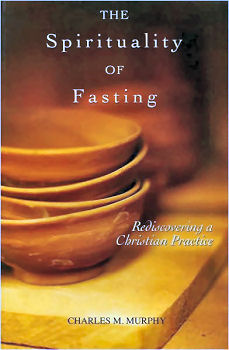
|
Posted March 10, 2010
Book: The Spirituality of Fasting: Rediscovering a Christian Practice Author: Charles M. Murphy Ave Maria Press. Notre Dame, IN. 2010. Pp. 114 An Excerpt from the Jacket: Pope Benedict XVI has placed great emphasis on “the value and meaning of fasting,” observing that “this practice needs to be rediscovered and encouraged again in our day.” In timely response, The Spirituality of Fasting draws on sources ancient and current — from Augustine to Michael Pollan — to consider anew how fasting informs the relationship between creator/creature, body/soul, and rich/poor. An Excerpt from the Book:
The practice of charity at the start must be seen not only as an essential accompaniment of our fasting, but as its very goal. We seek through fasting a greater compassion, a softer heart. This is in contrast with a heart that might become more rigid in traditional dieting through mere fasts of willpower and self-control. In charity, St. Anthony gave us his personal witness by taking literally the Lord’s command to sell all his possessions and give the proceeds to the poor. While that may not be an option for most people, certainly a greater simplicity of life in general and a conscious refusal to buy into the consumerist culture that surrounds us must characterize our piety. To mention just one example, the renting of storage space has become a growth industry in our country because we have acquired so much stuff that even our cluttered garages cannot contain it all anymore. Stepping away into the desert perspective of Lent, we can recognize and repudiate the greed, avarice, and selfish exploitation that pass for normal life in a capitalist society, which bases itself on the profit motive and the accumulation of goods as the only measures of personal success. A wasteful, throw-away existence is not only characterized by ignorance of the earth’s limited resources, but also blinds us to living conditions of the vast populations who earn their living in a globalized market. Poverty of spirit is more important today than ever as a means to practice social charity. In this context we should recall the admonition of the American bishops to strengthen our ascetical practice by designating every Friday not only as a day of penance, but also as a special occasion for the practice of charitable deeds done in the name of Christ. This linkage of penance and charity helps us to keep in mind that divine charity is the perfection we seek through our self-denial. Divine charity may seem like a difficult thing to practice, but a simple act, such as the Skip-a-Meal program can give us each week the opportunity to make charitable contributions by spending less on feeding ourselves. If we look, we can find other equally appropriate ways we can incorporate this in our own lives. This link between self-denial and charity is exemplified in the lives of the early desert ascetics. While solitude was important to these monks, it would be a wrong idea to characterize such ascetics as living lives of total isolation. Such would go against the absolute priority of the practice of charity in ascetical life. Their hermitages often were near villages to whose way of life the hermitage represented constant challenge. There was back and forth constantly between village and hermitage, the people seeking the assistance of the holy man’s spiritual power in solving various problems they had and his objectivity and wisdom in tangled human relations. In that society of ultra-patriarchalism, the biological fathers were distant from their children, serving as the awesome preservers of society’s strict standards. The holy men took on the function of the warm and loving pedagogue to the youths who came to them for guidance. Table of Contents: 1. Recovering a tradition 2. A body humble before God: how fasting helps heal our relationship with God 3. A body fit for resurrection: what the ancient ascetics have to teach us 4. A body beautifully made: the Christian notion of the person and fasting 5. A body socially responsible: how fasting grounds our solidarity with others 6. The three great pillars of piety as a practical program Conclusion: Fasting and feasting: the spirituality of fasting |
|
